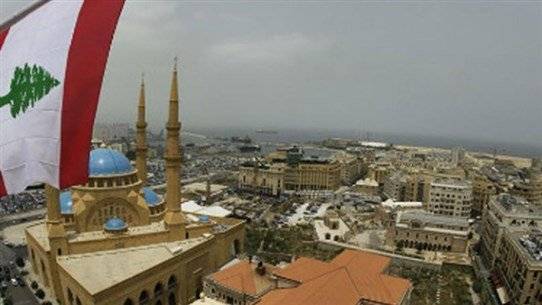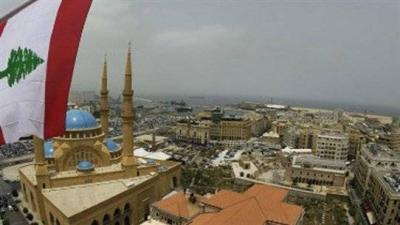Discussions in economic and banking circles indicate expectations of immediate and cumulative gains for Lebanon in the coming months, which could result from the automatic and subsequent effects of signing a maritime border demarcation agreement with Israel. This is further supported by direct American backing for both sides to start implementing the provisions aimed at initiating the pumping from the "Krishe" field, alongside the French company "Total" committing to begin exploration in the "Sidon-Qana" deposit, with expectations to reach the drilling phase by the beginning of next spring.
Initial estimates from economists and experts agree on identifying signs of qualitative transformations that could facilitate positioning on positive trajectories, particularly in monetary and financial fields, ahead of the journey to reach the status of oil-producing countries, which is estimated to take between 3 and 5 years, barring any adverse developments. However, this process is contingent on field evaluations of the promised reserves and their commercial quantities, given that preliminary estimates of the potential oil and gas wealth vary widely, ranging from $500 billion to $1 trillion.
Energy Minister Walid Fayad asserted that "the historical achievement is not just the demarcation of borders; the importance lies in the commitment to exploration and starting it, as we need this. We will continue to monitor the implementation mechanisms in the next phase in cooperation with Total and international partners interested in the gas sector." Meanwhile, Finance Minister in the caretaker government, Youssef Khalil, commented that while the tangible translation of the demarcation step may take years, it "serves as a moral lever to rise from the state of collapse, to restore confidence, and to begin the return of investment to Lebanon."
The Minister of Finance stated: "It is true that this step has placed Lebanon on the map of oil-producing countries, and its economic outcomes are assured; however, it is also true that managing this wealth wisely and transparently is the safeguard of the desired results. Therefore, we hope that the unity of the Lebanese stance regarding the demarcation file will extend to the next immediate reform steps, which alone are capable of rescuing the Lebanese economy and financial situation from the worst crises it faces in terms of difficulty and complexity. Only then can we say that we have embarked on a serious path leading to correcting a chronic imbalance on realistic and scientific foundations, meeting the expected fruits of the demarcation that bring recovery and achieve prosperity."
Apart from the purely oil-related aspect and its medium and long-term projections, economists and bankers contacted by "Asharq Al-Awsat" have pointed out that the American umbrella that pushed for the conclusion of the demarcation will not be limited to this file alone. Thus, it is very likely that American support will expand to help Lebanon dismantle some persistent service obstacles, especially in the ailing electricity sector, which is consuming the largest portion of household incomes and placing severe financial and logistical burdens on institutions and business sectors, along with its catastrophic impacts on the entire public and private services system.
In forecasts for this sector, there is circulating information about an anticipated American push aimed at revitalizing World Bank financing and resolving the obstacles related to agreements for electricity imports from Jordan and importing Egyptian gas through Jordanian and Syrian territories to the power plants in Deir Ammar. It is noteworthy that the international institution has adopted a "long wait" in approving the promised loan of about $350 million, citing the lack of "political viability," particularly based on the Lebanese side's procrastination in launching the regulatory authority for the sector, in addition to complications related to American sanctions on Syria, which led Egypt to request an official exemption from the U.S. Treasury Department beforehand to exclude gas imports from the implications of the Caesar Act.
According to a major banking analysis in contact with "Asharq Al-Awsat," the new realities and explicit American support will motivate international rating agencies—especially "Standard & Poor's" and "Moody's"—to highlight in their upcoming reports the expected yield from the demarcation agreement and subsequent executive steps, which may affect the deteriorating credit rating currently at the level of "default" on sovereign debt issued by the Lebanese government, and the presumed improvement in the state's financial solvency, despite facing severe liquidity shortages in foreign currencies.
Indeed, traders and agents of investment portfolios have noted a partial demand for international bonds (Eurobonds) in foreign markets, with a slight increase in prices that had fallen to their lowest levels, reaching between 5.5 and 6.13 cents on the dollar; thus accumulating losses between 4 and 4.63 dollars since the beginning of this year alone, noting that the nominal value of each bond is $100. The total nominal portfolio, excluding outstanding interests, amounts to about $31 billion, predominantly held by international investment companies and funds, in addition to the central bank and local banking institutions.
While the "oil" event's effect has seemingly disappeared from monetary exchanges in parallel markets, as buying and selling operations continued at record highs of nearly 40,000 Lebanese pounds per dollar, activists in the informal currency markets confirmed significant declines in the volume of supply and demand, reflecting traders' and importers' hesitance to request hard currency in anticipation of positive reactions resulting from the official acknowledgment of the demarcation agreement and its implications, potentially curbing speculation and reviving the value of the pound.
Bankers and activists hope to witness a period of calm in the monetary field, accompanied by a steady improvement in the concentration of most transactions via the "SAYRAFA" platform managed by the central bank, which currently executes daily supply and demand operations at a level of 29,800 pounds per dollar, which is about 10,000 pounds less than the prevailing rate in informal markets; noting that the Ministry of Finance will start at the beginning of next month calculating customs duties on imports at a rate of 15,000 pounds per dollar.
Restoring the central bank's pivotal role in the currency market would expedite efforts to target the restructuring and unification of exchange rates. Beneath positive atmospheres that are likely to be strengthened through the availability of internal consensus to achieve imminent constitutional entitlements, including the election of a new president, any presumed improvement in the pound's exchange rate will automatically curb rampant inflation, which has accumulated astronomical increases exceeding a combined rate of 1,300 percent over three consecutive years of monetary and financial collapses.




